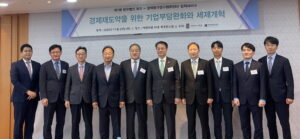
On November 28, 2023, the Policy Evaluation Research Institute (PERI) held its first joint policy seminar on “Reducing Corporate Burdens and Tax Reform for Economic Rebound” after signing a strategic business agreement with law firm Hwawoo (Yoon and Yang LLC) in last September.
In recent years, the government has been promoting economic recovery through easing business burdens and tax reform. In particular, to respond to economic issues and fulfill national tasks, the Prime Minister’s Secretariat created a regulatory reform task force last year, and the Ministry of Economy and Finance formed a tax reform task force, showing the government’s policy will.
PERI held a policy seminar on the need to develop and utilize a Business Burden Index (BBI) that includes taxes, quasi-taxes, and regulations, as well as strategies to strengthen corporate competitiveness through tax reforms that add burdens to companies.
In his congratulatory remarks, Ki-sun Bang, Minister of the Office for Government Policy Coordination, said, “In order for our economy to rebound and grow sustainably, we need to enhance economic vitality and improve economic conditions through free economic activities and investments centered on the private sector and the market.” “I would like to ask you to gather your opinions here today to identify policy issues to strengthen corporate competitiveness and rebound the economy.”
“PERI is the only organization that can practically implement desirable policy formulation, accurate policy evaluation, and the realism of policy alternatives,” said Il-ho Yoo, former Deputy Prime Minister of Economy. “Developing a BBI to ease business burdens is an essential task for our economic renaissance, and this is the importance of the PERI, and today’s seminar is also significant in that regard.”
“Policy evaluation is a very basic measure that allows us to know how a policy affects the improvement of people’s quality of life and what the real expectations are,” said Chong-bum An, President of PERI. “Today’s seminar is a meaningful opportunity to explore how to rationally improve unreasonable tax systems such as inheritance tax and purpose tax that increase the burden on businesses and make family succession difficult.”
In addition, An presented “The Necessity of Developing a Business Burden Index and Strategies to Reduce Business Burden,” emphasizing that “once the Business Burden Index (BBI) developed by PERI is presented, it will function as a key reference index for business activities and government policy development along with the BSI and CSI indexes.”
Kyung-yup Cho (Head of Economic Research, Korea Economic Research Institute) presented “Problems and Reforms of the Inheritance Tax System,” stating that “internationally, many countries are abolishing or easing inheritance tax,” and that it is necessary to “reduce the inheritance tax rate, expand the deduction amount, expand the family inheritance deduction and deferred payment and abolish unreasonable inheritance tax provisions.”
Won-ik Son (Research Fellow, PERI) presented “How to Reduce Corporate Burdens and Strengthen Corporate Competitiveness through Corporate Tax Reform” and emphasized that “the corporate tax system must be reformed to secure the competitiveness of Korean companies in the fierce global competition such as industrial reorganization and digital transformation due to the recent uncertainty in the economic environment.” “In particular, the corporate tax system should be reformed in the direction of simplifying the tier of corporate tax, reducing corporate tax, and expanding R&D tax credits.”
<PERI,Policy Evaluation Research Institute>


